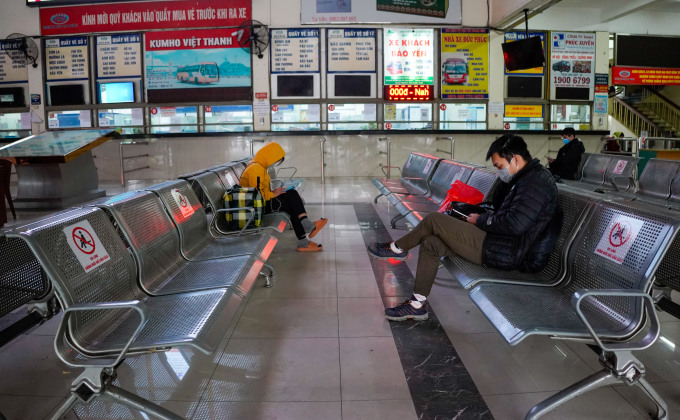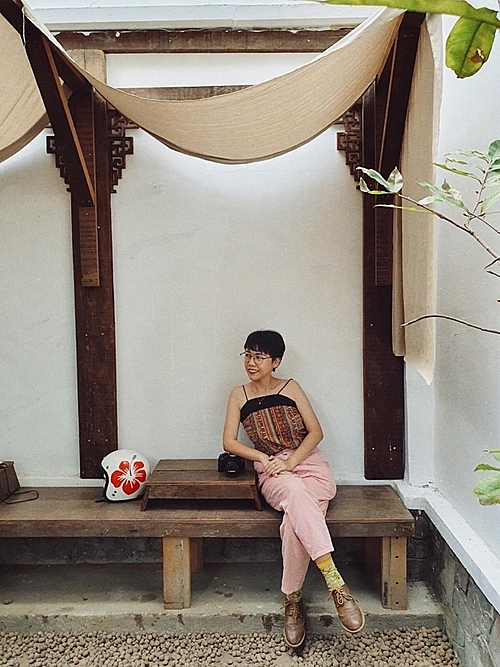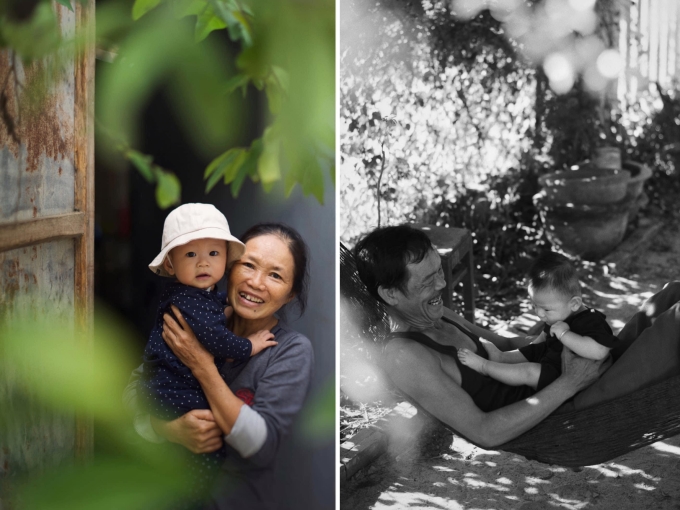Nguyen Dang Ngoc Linh, 25, describes her upcoming Year of the Tiger 2022 with only two words: “poor” and “sad”.
Around this time last year the 25-year-old was busy buying new clothes and ao dai and getting a new haircut and nails done to get ready to ring in the Year of the Ox.
But this year she plans to spend the entire nine-day Tet (Lunar New Year) break, starting Jan.29, by staying at home in Bach Dang Ward in Hanoi’s Hoan Kiem District.
Linh has been unemployed for six months after her employer, a marketing firm where she had worked since graduating college, had to lay off staff to stay afloat.
She is still unemployed, partly because she has been unable to find a suitable position but also because of pandemic blues. With savings dried up, she does not plan to buy anything for Tet.
“I only set aside VND2 million ($87.72) to give my parents,” she says.
 |
|
People at a bus station in Hanoi, December 2021. Photo by VnExpress/Pham Chieu |
Traditionally during Tet, the country’s biggest and by far most important festival, Vietnamese travel in their millions to their hometowns – with many living abroad too making their way back – to be with their family.
It is a time for families to clean and decorate their houses, wear new clothes and enjoy reunion meals of traditional Lunar New Year foods such as banh chung (glutinous rice cake).
Though not losing his job like Linh, Ngo Duy Anh still feels “depressed” because this Tet is likely to be the first when he won’t be able to buy gifts for his family.
He had to change jobs four times because his employers kept delaying payment of his salary.
The Hai Phong City native joined a company last December, but it is paying employees only half a month’s salary and asking them to “help the company during this hard time”.
Anh, now residing in Hanoi, lives from paycheck to paycheck with no money to spare. He has to spend VND3.5 million out of his meager monthly income of less than VND5 million on rent alone.
But his family has a tradition that children who work away from home should buy gifts for the extended family on both the paternal and maternal sides. With a total of 10 people to buy gifts for, Anh has considered borrowing from friends, but then everyone around him is also in a tough situation.
“If I don’t give any gifts, I’ll be told off, and if I buy fewer gifts, I’ll be compared with others in my hometown. I’ve never hated Tet as much as I do now”.
Every aspect of life, including Tet, has been impacted by Covid-19.
A survey of people’s expectations for Tet 2022 done by market research firm Q&Me last November found 64 percent saying finance was their biggest concern.
Nearly half of those polled plan to save more money this year than in previous years.
The Tet Insight 2022 survey conducted by Adtima, a local marketing agency, found 33 percent of people saying they are afraid of spending too much money during Lunar New Year, and 17 percent being concerned they would not be able to spend as much money during Tet as they do every year.
Reunions during Tet are no longer a natural or easy thing to do amid the pandemic.
In the northern Thanh Hoa Province, Doan Thanh Huong, 30, is unable to see her mother though their houses are only 200 meters apart since Huong is quarantining at home after coming into close contact with a Covid patient who had come from Hanoi.
She says: “My mother misses me and wants to see me from a distance. But I have had to refuse and tell her to go back home because it wasn’t safe for her”.
Huong’s four other sisters find themselves in a similar situation. They are married and live with their families, but do not dare visit each other because they came into contact with people suspected to be infected.
Huong laments: “While our families were able to gather around to make jam, dry foods during last Tet, now we just hope everyone will have enough money to get by. But I’m not sure”.
Health has become the top concern for people ahead of Tet.
According to a Q&Me survey, 81 percent of Vietnamese people prioritize ‘health’, surpassing ‘family reunion’, which topped in previous years but is now second with 71 percent.
Adults aged 25 and above are more likely to be worried that a family member is infected with Covid.
 |
|
Cao Y Linh intends to spend the upcoming Tet holidays exploring HCMC. Photo courtesy of Linh |
Cao Y Linh will celebrate Tet alone for the first time in HCMC. The journalist had planned to fly to Hanoi to visit her family, but changed her mind and decided to wait for the pandemic to subside before traveling.
“I’m also afraid of contracting Covid-19 since I get sick easily and fear I would accidentally bring the virus home to my mom, who also has pre-existing health conditions,” she says.
Though she will celebrate Tet alone, she intends to spend her free time exploring HCMC and trying out new options such as public bicycles and night river buses to alleviate her sadness.
“The good thing about not returning to my hometown is that I can save money for lucky money and buying gifts”.
But Pham Thuy Huyen, a student in France who returned to Hanoi last year, was desperate to return because, after a year of coping with the pandemic, she realized that family was the most important thing for a person.
Already homesick after four years away when she learned that someone in her family had Covid, the 33-year-old Ph.D. student decided to put her study plans on hold in order to be with her family.
“Many people advised me to stay in France to finish my studies and then return, but going home to be close with my mother was more important for me,” she says.
She admits her worst fears.
She saw on social media how some international students were unable to return home in time to see their loved ones one last time, and “I did not want to be in a similar situation”.
Dr Nguyen Do Hong Nhung, a psychologist and lecturer at the Thai Nguyen University of Pedagogy, says: “Covid-19 has forced us to rediscover our priorities. When we realize that life is finite, the closest thing to us is our family”.
Huyen’s professor has thankfully allowed her to attend online classes. She and her mother are now preparing for Tet and she is also working on her thesis, which is scheduled to be completed in July 2023.
She will also marry her fiance next week.
“Tet this year will be the most memorable one yet for me”.
 |
|
Bui Cao Tai’s photos of his mother and father in 2021. Photo courtesy of Tai |
Photographer Bui Cao Tai said he will spend this year’s Tet taking more photos of his parents.
Tai had been photographing people since 2017, taking hundreds of thousands of photos for others, but never his parents. Until now that is, after he and his wife and son moved from Ho Chi Minh City to the central Binh Dinh Province to ride out the pandemic.
When he took pictures of his parents, he felt “very happy” and realized how much they have aged.
“Wrinkles have become more visible on their face, but I’ve been so preoccupied with work that I did not have the chance to notice”.
He adds that these photos are now his most precious assets.
- Reduce Hair Loss with PURA D’OR Gold Label Shampoo
- Castor Oil Has Made a “Huge” Difference With Hair and Brow Growth
- Excessive hair loss in men: Signs of illness that cannot be subjective
- Dịch Vụ SEO Website ở Los Angeles, CA: đưa trang web doanh nghiệp bạn lên top Google
- Nails Salon Sierra Madre
 VnExpress News The News Gateway of Vietnam
VnExpress News The News Gateway of Vietnam





